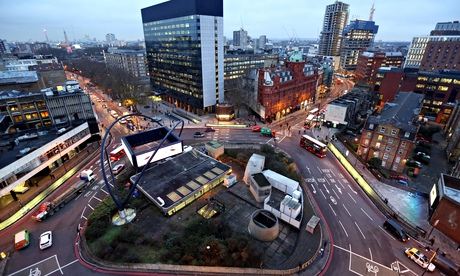
BT is to tackle the slow broadband speeds that have hit businesses in London's flagship Tech City area by trialling in October a new system that could eventually be used across the UK.
The pilot will be in Shoreditch, where only two-thirds of premises have access to superfast broadband. The news comes on the day the local MP Meg Hillier, who has described the poor broadband as a "national embarrassment", is to host roundtable on the matter.
David Cameron's hopes of creating Britain's answer to Silicon Valley in east London have been held back by poor connections, with entrepreneurs, venture capitalists and even the former New York mayor Michael Bloomberg highlighting the problem.
"In the downtown central part of London there's an enormous amount of buildings without high-speed communications," Bloomberg said in June. "In today's world that's almost as important as water and electricity. You have to have it."
BT's fibre to the remote node (FTTRn) system brings optic fibre cables from the local telephone exchange to the street, where a small box will be attached to a telegraph pole, fixed to a wall or sunk into a manhole. Copper wires will carry the signal the rest of the way to the doorstep. The nodes can deliver speeds of up to 80Mbps, equivalent to those of BT's standard superfast service.
To prepare for the node pilot, the investment agency Tech City UK has been asked to help identify problem areas, said Joe Garner, who heads the BT Openreach division, which builds and maintains the company's network.
"We have asked Tech City UK for help to identify the businesses most in need and will invite them to join the pilot," he said. "One of the issues we've had is it's very hard to define Tech City as a geographic area. Some definitions we've seen encompass properties as far away as the Olympic Park."
Trials are also planned for rural areas, where it could be used to speed up internet for homes and businesses at the end of a very long copper line. Leyburn in North Yorkshire has been selected for a pilot, in which will 5,000 premises in and around the market town connected with FTTRn, with speeds above 25Mbps.
If the pilots are successful, BT plans to adopt the node system nationally, and its use could become widespread.
Tech City has suffered partly because of the high number of buildings with lines running directly from telephone exchanges, rather than from BT's green street cabinets. Direct lines tend to serve large buildings like blocks of flats or offices, but they are made of copper and not capable of carrying fast internet. They are also expensive to replace, because roads need to be dug up.
BT offers leased lines to businesses, but these can cost several hundreds of pounds a month and the option is too expensive for many startups, which would prefer to pay residential broadband rates.
The residential fibre rollout has focussed almost exclusively on replacing the copper lines that run to its green street cabinets with fibre, which means many flats and offices, including luxury developments like One Hyde Park in Knightsbridge, west London, have been left in the slow lane.
Hillier has asked Cameron for a comprehensive review of broadband, and for improved national plan to get more premises connected to faster lines. She has asked businesses to air their concerns at a meeting this morning in the Tech City area.
Introducing the event, the Labour MP said: "As I have said to the prime minister in the past month, broadband is a national embarrassment and action is urgently needed. In Tech City, the much trumpeted European hub of technology, businesses are moving out because they simply cannot access high-speed broadband."

